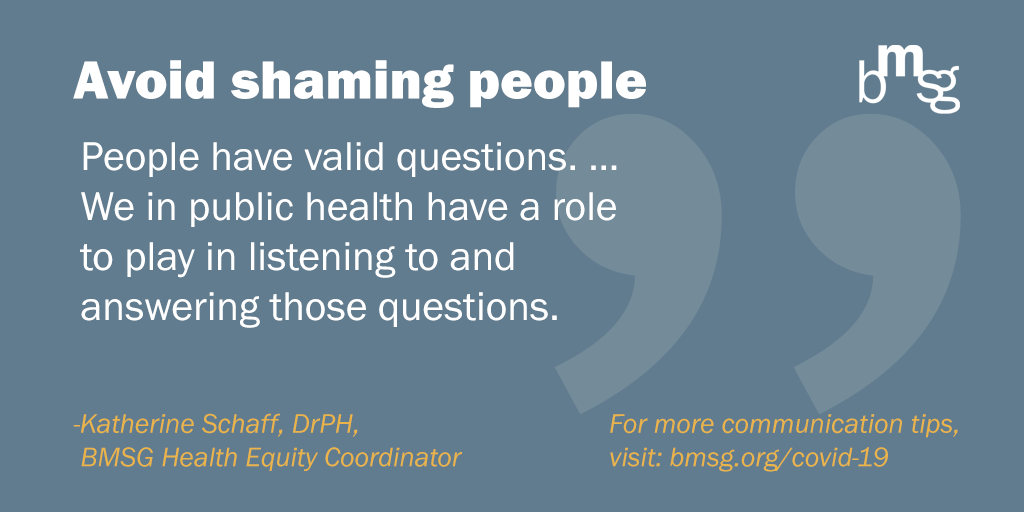Communicating about COVID-19
We’re creating and compiling resources to help public health advocates, staff in local health departments, and others communicate more effectively about COVID-19 and how it intersects with other important public health issues.
Many thanks to the Blue Shield of California Foundation and The California Wellness Foundation for supporting our work in responding to the coronavirus pandemic and to The California Endowment and Kresge Foundation for their flexibility as priorities shift to address the crisis.
Related resources
Communicating about vaccines: Meeting people where they are
Shame is all too common in communication about vaccines, but we should avoid it because it is not effective at changing individuals’ hearts and minds. Instead, as research has shown, we need to demonstrate empathy, listen without judgment, and share messages using credible local spokespeople who are easy for audiences to relate to. Learn more in this video, the fourth in a series from Berkeley Media Studies Group.
Communicating about vaccines: How to discuss racial equity in vaccine uptake
To help ensure equitable vaccination rates in all neighborhoods, public health advocates and practitioners must center communities of color in their messages. Being silent on racism allows vaccine opponents to invoke medical oppression in their communication, stoking further division, hesitancy, and distrust. This video, the third in a series from BMSG, offers strategic communication tips for advancing racial and health equity in immunizations.
Communicating about vaccines: Illuminating the context for access and hesitancy
To boost vaccine rates, public health practitioners and advocates need more than just compelling messages; we also must confront the practical barriers that make it hard for some people to access the vaccine — and credible information about it. In this video, the second in a series from BMSG, we discuss the context for why vaccination rates are lagging in some communities.
Q&A: Fighting the war against vaccine misinformation and fear
In this interview, BMSG’s director and health equity coordinator share insights for communicating more effectively about COVID-19 and vaccines. They discuss how to address misinformation, what voices we need to uplift, and why companies like Facebook and Google need to be held accountable.
Communicating about vaccines: Investing in trusted messengers
As the Delta variant surges, it’s more critical than ever to communicate with the public in ways that foster trust. In this new video, the first in a new series from Berkeley Media Studies Group, BMSG offers strategic communication tips to help public health advocates and practitioners do just that.
Talking about COVID breakthrough infections: Recommendations for health departments
Media coverage on breakthrough infections in people who are vaccinated make talking about COVID more complicated. We hope these initial talking points will be helpful. As this issue evolves, the talking points may evolve as well.
Blog: From misinformation to missing infrastructure: Overcoming barriers to COVID-19 misinformation
Headlines about misinformation and vaccine hesitancy may be overshadowing the bigger problem of structural barriers and a fractured health care system, which are major reasons why many communities of color have not received their share of vaccines. BMSG’s Lori Dorfman reflects on this and other lessons following a recent national forum on the COVID vaccine.
Communicating about the COVID-19 vaccines: Guidance and sample messages for public health practitioners
As we get closer to the distribution of vaccines for COVID-19, policymakers and the public are seeking information and voicing questions about their safety and efficacy. Public health practitioners at health departments and elsewhere can play an important role in addressing concerns and building trust to support the equitable rollout of vaccinations. This resource contains tips to help public health leaders communicate more clearly and effectively about vaccines.
Tips for communicating about masks in the midst of misinformation
Public health practitioners provide policymakers, the media, and the public with accurate, timely information. But how do they do this as misinformation proliferates and efforts to prevent illness become politicized? Although BMSG typically focuses on communication aimed at shaping health policy, as mask mandates become more common, local health departments are increasingly seeking ways to overcome the challenges they face in supporting residents in adhering to such mandates. There’s no one easy communication solution, but this tip sheet offers some quick tips and examples to help.
Blog: Communicating about housing and COVID-19: Tips for responding to reporters
Housing policy is complex, and communicating about it can be tricky, especially when you are talking with a reporter. Still, just because you aren’t in full control of the message doesn’t mean you can’t shape the narrative. A recent event with local journalists shed light on how advocates can do just that.
Communicating about racial equity and COVID-19: Connecting data to context
Without background knowledge or proper context, when people hear statistics about racial disparities in COVID-19 outcomes, they are likely to attribute the cause to individual behavior. This tip sheet offers suggestions for incorporating the bigger picture into storytelling to help audiences understand the systemic causes of — and solutions to — inequities.
Talking about health, housing, and COVID-19: Keeping equity at the forefront
We developed this working document to support public health practitioners, community organizers, and others who are striving, amid COVID-19, to elevate equity-focused solutions in housing and health news and before policymakers. The guide is focused on shifting the narrative from safety during the pandemic to the importance of treating housing as essential to public health.
COVID-19: Addressing discrimination and racism: Local health department support guidance
These rapid response guidelines, developed by an equity-focused subcommittee of the Public Health Alliance of Southern California (Alliance) with input from BMSG, can help local health departments use language and images that fight discrimination and stigma while remaining consistent with science.
Op-ed: Drs. Fauci, Birx should not just stand by as Trump spouts hyperbole, misinformation
BMSG Director Lori Dorfman and David Tuller, senior fellow in public health and journalism at U.C. Berkeley, use the opinion pages to argue that the COVID-19 pandemic requires politics to be set aside in the interest of the public’s health. When experts like Dr. Anthony Fauci correct medical misinformation but avoid commenting on the president’s political pronouncements, they lend implicit credibility to the Trump brand, Dorfman and Tuller explain: “Dedicated scientists should be able to perform their life-saving duties without having to navigate the political minefields of a presidential election campaign. The long-term consequences of placing public health officials in such an untenable position are likely to be devastating.”





